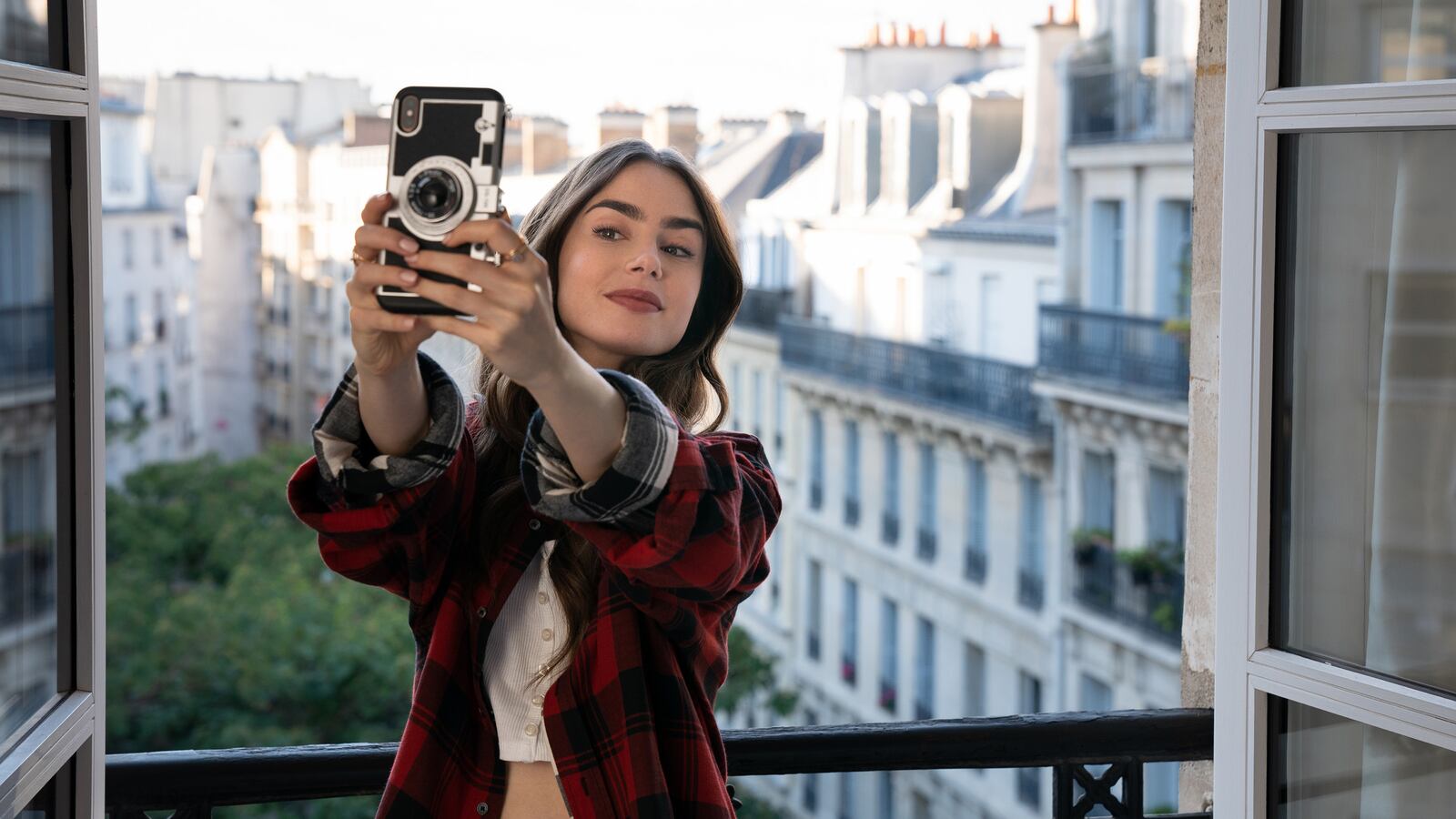Perhaps it was wrong to expect so much. Netflix’s Emily in Paris was released the weekend President Donald Trump was admitted to the hospital for whatever the hell that was all about, and his shifty-looking doctor—who would only last a week in General Hospital as the new villain before being rejected by scriptwriters and audience as too obvious—told us nothing but what President Trump wanted us to hear.
A weekend of stress and stupidity unfolded, and continues today. My hope was that Emily in Paris would, if not solve anything, then at least lighten a frazzled mood. Think of it: Paris, beautiful clothes, beautiful people, romance, comedy, warm-bath, escapist television… But no, it left this viewer even more furious.
It is the brainchild of Darren Star, who created Sex and the City, so it is no surprise that Emily seems like a younger version of Carrie in the French capital in the last two episodes of the TV show: Beautiful and beautifully dressed, but an American alien, out of sorts, bewitched by the city’s beauty and sunk by its people’s supposed hauteur. Emily (Lily Collins) even steps in dogshit like Carrie did, because dammit those Frenchies don’t scoop. “Merde,” Emily says. Sadly, she doesn’t get to cutely wash her feet off like Carrie did in a street fountain.
There is nothing wrong with culture clash comedies, and the fraught America-France axis is well-oiled: For a long time Americans have gone to Paris for the beauty and history and romance, and trashed its people and stinky, unpronounceable food, while the French look upon Americans as uncivilized, ignorant yobs. It’s an eternal international joust of easy stereotypes and even easier insults.
The sell of Emily in Paris is simple enough; indeed it’s a familiar fairytale: given a surprisingly paltry amount of revision, we have seen it all before. Emily works for a marketing firm in Chicago and is sent to Paris to advise the French about selling stuff.
This is the series’ first mistake. The scriptwriters, understandably, cannot make Emily’s professional life interesting. How can anyone make the language of marketing interesting? I think the producers realize this early on, and instead just deploy a bunch of stuff you’ve already seen on The Hills, The City, Sex and the City, and The Devil Wears Prada to make things more palatable—namely fashion shows and fashion parties.
These events give Emily a chance to dress up in extravagantly colored and sculpted clothes that look mostly eye-puncturingly brash and ugly. They also give us a chance to forget the fundamentally fallow dramatic premise of her being in the city.
Emily in Paris bombards us with heavily confected prettiness—the clothes, the streets, the characters (at least it allows the amazing Ashley Park, as Emily’s friend Mindy, to sing). But it is also low on all the charm it should possess. You don’t root for its lead character, because there is not much to root for. Whenever this person sees something she likes, she whips her phone out and snaps a selfie.
The show is obsessed by her rising number of followers. How does Emily feel about being somewhere new, somewhere foreign? She doesn’t care. She’s more interested in the background to every shot. She gains influence and power this way, but it also makes her seem utterly shallow and surface.
Even when the show puts Emily in a room of other influencers to show how normal she is and how grotesque they are, the scene has the opposite effect; she is just as grasping, she is just cuter as she grasps. What is really terrible about Emily in Paris? That its heroine is a social media-addicted influencer who works in marketing and appears to have no depth of character beyond those signifiers. The show is as shallow as she is. She trots around in cute outfits, cute guys on her trail, solving utterly forgettable professional crises. That’s it.
The office is where the main culture clash occurs. But again, the dynamic is something you have seen in all those shows above. There is bitchy, mean boss Sylvie (Philippine Leroy-Beaulieu), who is an older woman and must pay for it it seems, and a few office flunkies, who are patronizing, sexist, inappropriate—and, then, suddenly very pro-Emily. If you can cope with the repetitive structure of the older lady boss being a cow, the male flunkies screwing up their faces like castrated imps, and Emily rising above it all to pull a brilliant idea out of her hat to save the day every time, then this is the show for you.
She does not learn French, she uses a translation app on her phone and holds up the voice to her colleagues. What the fuck is she doing not-living and working in this city? Why should it smile back at her? She has moved to a foreign city in body only.
Let’s talk about Emily’s amazing ideas. They are not amazing. They are, like almost everything in this show, silly—and almost all about her alleged mastery of social media. There is not one dramatic resolution to a work problem that marks Emily out as an innovative thinker. There is also the issue of the office.
Emily is sent to Paris as an equal, indeed she is sent there to advise. Now, it may be natural for the French staff to bridle at the American intrusion, but Emily very quickly and happily embraces a pixie-ish self-demotion. She willingly becomes their punching bag and insult receiver. She smiles, and just continues on. By the end of the show, she has the air of an intern grateful just to have a desk.
It is not unusual for female characters to be diminished on TV and film. But Emily in Paris diminishes its heroine from the first moment; they turn her from professional woman to simpering girl. It is not romantic, or cute, but dispiriting, particularly as the show at one point decides to take what seems at first like an interesting side-turn down #MeToo alley.
Emily balks at male professional figures of authority leching after her. But, as quickly as this is raised, it is swerved. It is strange to bring so current an issue to the fore and not mention President Trump—but that would be too much reality, too present, and so he goes unmentioned. One good thing: French people have clearly been involved in the show, and so there are details and cultural references—like “BalanceTonPorc” being the French #MeToo—which ring true and sometimes sharp.
Otherwise, a general narrative laziness prevails. The bitchy French boss is the villain just as Andy’s (Anne Hathaway) older nemesis was Miranda (Meryl Streep) in The Devil Wears Prada. As in that film, indignity upon indignity is visited upon Emily by Sylvie as the series goes on. I get that Emily is supposed to be noble and the very embodiment of “when they go low…” but really?
She comes to this office, tells people that this is not how things are done in America, and yet won’t challenge her boss on her behavior and how she speaks to her? Emily has a voice and yet has no voice. She merely accepts that French people are mean to her face, as Mindy tells her. It is, as it always is in these sorts of shows, American have-a-go charm versus French snootiness. Cinderella versus Ugly Sister. Guess who’s going to triumph!
Leroy-Beaulieu is the best actor (and easily the best dressed character) on the show, and does as much as she can with a script that seeks to one-dimensionally demean her. A scene in a later episode is almost note-perfect. Emily and Sylvie find themselves in an elevator, sharing an emotional moment. Sylvie is having an affair with a married man. She is coolly pragmatic about it.
Emily isn’t buying this, and—good girl alert!—thinks she will ultimately be unhappy and gently tries to coax Sylvie to chat about it. I liked that Sylvie and the writers, instead of doing the predictable thing and letting Emily’s conventional morality win out, instead have Sylvie bring the drawbridge down again. But we are still left thinking the cold, hard bitch having the cold, hard relationship is in the wrong; a better show might interrogate Emily’s rosier romantic view and widen its perspective to include a more nuanced view of Sylvie.
Ah, the sex and romance. Don’t worry, fellow bingers, there is plenty of theees in Emily in Paris. For a start, there’s a hot chef, Gabriel (Lucas Bravo), living downstairs whose function is to look out to the world from beyond his floppy cheveux, make delicious food, and make puppy-dog eyes and accepting smiles at Emily. (Her empty perkiness is not like nails on a chalkboard to him; it is utter catnip.)
Emily likes Gabriel too, of course, but this is France—and there are a few frogs to kiss (and fuck too) first. One is an academic (boo, hiss), whose snobbery and intellectualism Emily strongly denounces. There are the lecherous fools at work. There is, in another one of those too-few-great moments of genuine shock, a teenager she beds.
And yes, c’est vrai, there is a sweetness to the scenes with Gabriel. That works. Phew.
One complication is that he has a girlfriend, Camille (Camille Razat), and in another potentially interesting moment when Emily and Camille meet, Camille seems to make clear to Emily that she finds her attractive and kisses her passionately. The possibility of a bisexual ménage à trois floats promisingly, then evaporates in favor of a yawny, conventional heterosexual love triangle.
This love triangle fizzles unthreateningly, and you realize that every episode shows not gumption or ambition, or Emily’s sense of wholesome good triumphing over Gallic cynicism. The key to every episode is transactionality. Even romance in the show is folded in the business of the show: Emily getting new work, Gabriel trying to make it as a chef, the likes and followers rising and rising.
It is strange, and yet so appropriate, that this show is obsessed by looks and symbols. It has a heroine who should be charming. It is set in a city that should ooze charm. It is structured like a fairytale. The clothes and settings should be the cherry. But Emily in Paris feels like an Instagram post itself—airbrushed, too perfect, too set in place, too calculated to elicit our pleasure. It doesn’t have mess, it doesn’t have a heart. It just twinkles at us, and expects this to be enough to gain our likes.
For some it will be; for me it was not. If Emily in Paris returns for season two, perhaps it can stop looking at itself and posing so prettily and start telling a story.







